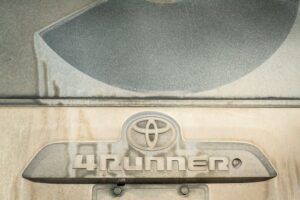The Toyota 4Runner is a well-established and pretty old compact midsize SUV.
It is important to note that the Toyota 4Runner has plenty of cargo space and internal space, making it an excellent family transporter.
It also offers outstanding off-road driving credentials to satisfy your adventurous side so you can have the best experience until it lasts.
You cannot purchase a vehicle without learning how long it will last because you expect a vehicle to offer great features and perform well and last for a long time.
So, how long do Toyota 4Runners last?
The Toyota 4Runner is a must-have for anyone looking for a durable SUV. This model is built to last for years and will not break down easily.
All aspects considered, it is said that 300,000 miles from this car is an adequate expectation. But do keep in mind that it is only reachable with good maintenance and care.
Now that you know the lifespan of the Toyota 4Runner, it will be reasonable for you to learn how you can enhance it and make it deliver efficient performance for a long time without losing any miles.
Read this article to find out more about the 4Runner. Plus, I have also included a frequently asked question section, so be sure to read that.
Table of Contents
- 1 What Is The Average Life Expectancy Of A Toyota 4Runner?
- 2 Does Toyota 4Runner Last Longer Than Other Similar Vehicles?
- 3 Life Expectancy Of Toyota 4Runner Car Parts
- 4 What Is Good Mileage For A Used Toyota 4Runner?
- 5 How To Increase How Long Your Toyota 4Runner Last
- 6 Problems That Limit The Life Of Your Toyota 4Runner
- 7 What To Look For When Buying A Toyota 4Runner
- 8 Frequently Asked Questions
- 9 Conclusion
What Is The Average Life Expectancy Of A Toyota 4Runner?

The Toyota 4Runner will run generously for a long time if you stick to the maintenance plan and take care of any damage and any bursts that may occur and result in further problems.
Toyota vehicles are designed to be sturdy and long-lasting.
Toyota cars may be expected to survive a long time due to Toyota’s competent engineers, outstanding production procedures, and the use of only the best quality equipment.
If properly maintained, a 4Runner can last for around 200,000 miles on average, but you can also expect more from it, making it reach up to 300,000 miles.
You just need to stay consistent with the maintenance.
Does Toyota 4Runner Last Longer Than Other Similar Vehicles?
The most important test of the Toyota 4Runner’s stability, reliability, and safety is to compare it against the competitors.
All forthcoming rivals’ data will be employed to determine how reliable the data is. This part will assist you in determining whether or not you wish to purchase this vehicle.
Let’s get started right now!
1. Toyota 4Runner Vs. Honda Pilot
Both the Toyota 4Runner and the Honda Pilot are well-known SUVs in the market that deliver sufficient performance and comfort while riding.
However, let’s compare the two to see which one is better.
- The Toyota 4Runner lasts longer than the Honda Pilot because it can only last up to 150,000 miles.
- The J.D. Power gave the Toyota 4Runner reliability scores of 81 out of 100, and the Honda Pilot received 79 out of 100, which is pretty close.
- The Repair Pal gave a reliability score of 4.0 out of 5 to Toyota 4Runner and 3.5 out of 5 to the Honda Pilot.
- The Honda Pilot is a lot roomier than the Toyota 4runner. The Honda Pilot is also more fuel-efficient than the Toyota 4Runner.
- The Toyota 4Runner is cheaper than the Honda Pilot.
- The Honda Pilot has around 1418 complaints on more than 18 model years, whereas the Toyota 4Runner has fewer problems, with around 529 complaints on more than 32 model years.
Both are efficient in their way, but you must know that the longevity, reliability, and quality, as well as complaints history, of the Toyota 4Runner, is a lot better than the Honda Pilot.
2. Toyota 4Runner Vs. Ford Explorer
Now coming to the big Ford Explorer, many say that it is roomier and more comfortable but let’s compare the two to see which is better.
- The Toyota 4Runner lasts longer than the Ford Explorer because it can only last up to 200,000 miles.
- The Repair Pal gave the Ford Explorer a reliability score of 3.5 out of 5, less than the 4Runner scores. The Toyota 4Runner and the Explorer have reliability and quality scores of 81 out of 100.
- The Toyota 4Runner is a better off-road vehicle than the Ford Explorer. The Ford Explorer has more towing capacity than the Toyota 4Runner.
- The Toyota 4Runner is more expensive than the Ford Explorer. The Ford Explorer has more complaints and problems than the Toyota 4Runner.
Overall, there is a lot in common between both vehicles, but the Ford Explorer cannot beat it at all when it comes to longevity.
Related: How Many Miles Will A Ford Explorer Last?
3. Toyota 4Runner Vs. Jeep Grand Cherokee
Another one of the most durable and efficient vehicles is the Jeep Grand Cherokee. Comparing the two will help you decide which one to purchase.
- Both the vehicles can last for a long period. The J.D. Power gave the Jeep Grand Cherokee a reliability score of 86 out of 100, which is a little more than the Toyota 4Runner.
- The Repair Pal gave the Jeep Grand Cherokee a reliability score of 3.5 out of 5, slightly less than the Toyota 4Runner scores.
- The Toyota 4Runner has more tow capacity than the Jeep Grand Cherokee. The horsepower of the Grand Cherokee is more than the 4Runner.
- The torque power of the Toyota 4Runner is more than the Jeep Grand Cherokee.
- The Jeep Grand Cherokee has a lot of problems around 3038 on more than 29 model years. These are a lot more than the Toyota 4Runner problems.
If you do consider buying from either of the two, then it is best to do a lot of research on them related to the complaints and problems.
The Jeep Grand Cherokee has a lot of complaints that can make you question its reliability, safety, and longevity.
Related: How Long Does A Jeep Grand Cherokee Last?
Life Expectancy Of Toyota 4Runner Car Parts
You must educate yourself about the life expectancy of Toyota 4Runner car parts. You will profit from this information in the prolonged run.
You’ll be able to rapidly analyze and fix any problems that arise with any parts. To have a thorough grasp of this part, make sure you read it all the way through.
Average Lifespan Of Toyota 4Runner Brake Pads
Brake elements such as brake pads and rotors have a normal lifespan of 30,000 miles up to 60,000 miles on the odometer.
Your driving manners and maintenance regularity will determine how long the brake pads on the Toyota 4Runner can endure.
Average Lifespan Of Toyota 4Runner Battery
The average battery life for a Toyota 4Runner is around three years up to 5 years, although this varies based on the classification of battery, weather ailments, driving patterns, and many other factors.
Clearing the terminals and centers of eroding with the appropriate cleaning treatment and a wire brush will extend the existence of the Toyota 4Runner battery.
Make this a habit, so your battery doesn’t get damaged easily.
Average Lifespan Of Toyota 4Runner Tires
Being sure of the integrity of the tires and how you employ them, the tires on the Toyota 4Runner can last up to 4 years or even more than that.
Off-road driving annually will hasten tire deterioration, especially if the tires are of poor quality.
The longevity also depends on how often you rotate the fires, so make sure to do that every 5000 miles to 7000 miles.
Average Lifespan Of Toyota 4Runner Transmission
Toyota 4Runner customers claim the model’s transmission system can endure 100,000 miles up to 120,000 miles. If you take excellent care of it, it will live longer.
You need to keep a regular check on it to get the job done timely, or else it can cause a lot of damage to the transmission system and other components.
Transmission fluid change, flush procedure, and transmission filter alternate are two common transmission maintenance tasks that must be done whenever required.
Related: Toyota 4Runner Transmission Problems
Average Lifespan Of Toyota 4Runner Spark Plugs
At 120,000 miles, Toyota advises rehabilitating the spark plugs in the Toyota 4Runners. They will decay quickly if you conduct a lot of hauling or stop-and-go driving.
When the spark plugs are worn, it is strongly advised to replace them. Misfires, stalling, and difficulty starting are all symptoms of damaged or worn-out spark plugs.
Average Lifespan Of Toyota 4Runner Key Fob
When it comes to the key fob of the Toyota 4Runner, you must know that a small battery is used to power the key fob.
Do keep in mind that if the Toyota 4Runner has a smart key fob, then the battery will last for 2 to 3 years, whereas a standard key fob’s battery may live for 4 to 6 years.
What Is Good Mileage For A Used Toyota 4Runner?

Purchasing a Toyota 4Runner with 200,000 miles on the odometer may not be the best decision.
To guarantee that your interest is worthwhile, consider purchasing a Toyota 4Runner with lower miles.
Keep in mind, however, that the lesser the mileage, the higher the vehicle’s price.
Purchasing a used Toyota 4Runner, on the other hand, is a good idea, and it may be more acceptable for many purchasers than buying a new car.
If you are certain about purchasing one, then go for the one with lower mileage. It will also be more reliable and last longer without any serious problems.
Only consider it if you can afford it because it can be quite pricey.
How To Increase How Long Your Toyota 4Runner Last
Knowing what sort of maintenance a Toyota 4Runner requires will help you achieve adequate gas mileage.
Please study all of the actions Toyota and other experts propose for the Toyota 4Runner to attain its full life span so you can comprehend everything.
- Acquire a laid-back driving attitude.
- Follow the manufacturer’s guidelines for maintaining your car.
- Make a practice of high-quality liquids and parts.
- Keeping track of improvements will help you prevent worse problems.
- Regularly clean and wash the Toyota 4runner to eliminate dirt, mud, and grime and stave off the rust on the dye and undercarriage.
- Inspect engine oil, coolant, brake, and transmission fluid levels of the Toyota 4Runner and top them off as required.
- Make sure you keep the Toyota 4Runner in a shaded area, especially in a garage, to protect it from the elements.
- Browse the owner’s manual to learn where key elements are found, what and how much the Toyota 4Runner demands, and how to analyze symbols and dashboard warning lights.
- Don’t put too much weight on the car.
- Any broken parts or particles should be replaced as soon as possible.
To lengthen the life of your vehicle, make a pattern of completing these items regularly. You’ll see a change if you keep consistency in your supervision.
Problems That Limit The Life Of Your Toyota 4Runner
Aside from studying its endurance and dependability, it’s also crucial to understand the Toyota 4Runner’s most prevalent difficulties so you can have a thorough grasp.
This information will assist you in anticipating problems and resolving them swiftly before they worsen.
So, with that said, here are some frequent issues that you should be aware of:
1. Frame Rusting
Several Toyota 4Runner customers have complained of rust and corrosion in the chassis and underbody of their vehicles.
According to the owners, rust occurs early on and gradually worsens with time, eventually making the vehicle dangerous to drive on the road.
Furthermore, some owners reported their dissatisfaction with the manufacturer, claiming that no recalls for the problem had been issued.
2. Door Issues
The Toyota 4Runner’s door has also been a source of complaints from various owners. It has been discovered that doors open while being locked.
Melted doorknobs were also reported by some owners, particularly at the back. Pre-2010 vehicles, particularly those manufactured between 1996 and 2007, are prone to this issue.
3. Worn Out Brake Rotors
There have been multiple statements of tremor concerns with the Toyota 4Runner’s braking rotors.
The rotors have to be replaced every few miles for no obvious reason, according to owners. This issue was largely reported on Toyota 4Runners from 2003 and earlier.
4. Anti Lock Brake Failing
Various Toyota 4Runner customers grumbled about the anti-lock brakes failing in difficult circumstances.
When driving over obstacles, the anti-lock brakes quickly disengaged, according to one owner.
A malfunctioning ABS caused another owner to lose supervision of the vehicle and resulted in an accident.
Toyota 4Runner models from the late 1990s and early 2000s are notorious for this issue.
5. Airbag Concerns
In crucial circumstances, a large number of Toyota 4Runner customers have quarreled about the vehicle’s airbag failing to deploy.
Because of the number of wounds condoned, this is likely the most significant issue.
Neck sufferings, bleeding puncture traumas, whiplash concussions as well as cracked vertebrae are among the injuries.
The issue has been observed in 4Runner vehicles dating back to 2000 and as recently as 2020.
Related: Toyota 4Runner Starting Problems
What To Look For When Buying A Toyota 4Runner
Now that you’ve read all of this and have decided to buy a Toyota 4Runner, there are a few things you should look into to be sure you’re making the best decision possible.
- Ratings for trustworthiness and safety.
- All aspects of safety.
- Discover everything there is to know about each generation.
- Vehicle advantages and disadvantages.
- The mechanics of driving.
- Recalls and customer complaints.
- Learn about the components of the vehicle.
- Learn about the engine, gearbox, fuel efficiency, and other aspects of the vehicle, as well as its capability.
- Issues that might arise.
- Affordability.
- Repair and maintenance fees.
- Competitors.
These are the things to think about while buying a Toyota 4Runner.
You should look into these aspects and understand everything you can if you want a promising model and sufficient experience.
Simply avoid the worst model years, which range from 2003 to 2005 and 2006 to 2008.
Related: Best And Worst Years For Toyota 4Runner
Frequently Asked Questions
Q1. Is The Toyota 4Runner A Reliable Car?
Yes, it is a reliable car. The Reliability Rating of the Toyota 4Runner is said to be above average, scoring a 4 out of 5 rating that places it 9th among 26 midsize SUVs.
It outperforms other midsize SUVs, which have an average Reliability Rating of 3.5.
Q2. Does Toyota 4Runner Have A Lot Of Problems?
Many holders of the Toyota 4Runner have reported problems with the front brake calipers and brakes, as well as warping and early rotor and master cylinder deterioration.
Brake difficulties are common in the fourth generation of the Toyota 4Runners, particularly in the model years 2003 up to 2005.
Q3. Is It A Good Idea To Buy A Used Toyota 4Runner?
Purchasing a used Toyota 4Runner is a fantastic idea.
The off-roading Toyota 4Runner is the top of the line, and purchasing one used is typically worth the stake because they keep their importance remarkably well.
According to iSeeCars, the average SUV loses 51.6 percent of its value over the course of five years, whereas the Toyota 4Runner only loses 36.5 percent.
Q4. Does Toyota 4Runner Rust Easily?
The Toyota 4Runner is known to have severe frame rust corrosion.
This is likely to happen with model years from 2003 up to 2009. It is best to avoid certain years because they can be quite problematic to deal with.
Q5. Is Toyota 4Runner Expensive To Maintain?
The Toyota 4Runner’s maintenance costs are said to be quite low.
The annual cost of maintaining a Toyota 4Runner is roughly $514, which is quite less than average midsize SUVs annual expense.
Conclusion
Understanding how long do Toyota 4Runners last can help you decide whether or not to buy one. However, don’t overlook other crucial aspects.
That’s why I compared it to other compact midsize SUVs as well, so you can have a better understanding.
Apart from that, it is unquestionably a good choice for a family due to its high dependability ratings, extended lifespan as well as performance.
Keep in mind that how generously you maintain your car determines its longevity, so make sure to keep it up to date.

I am Tahir Azam, and I have been writing amazing articles for TaxiHack for as long as I can remember. I know everything that is to know when it comes to automobiles and is always on top of industry news and developments. While I am not an expert by any means, I pride myself on knowing the ins and outs of many different problems and, of course, their solutions. The articles on our website are some of the best and well-researched content that you will find, and I spend countless hours making sure this remains to be true. This is why I ask you to take your time out and read some of my articles, especially if you find a topic that resonates with you or is something you are looking into. This way, you will find the perfect mix of information and tips on your desired topic. Learn more about Tahir.



